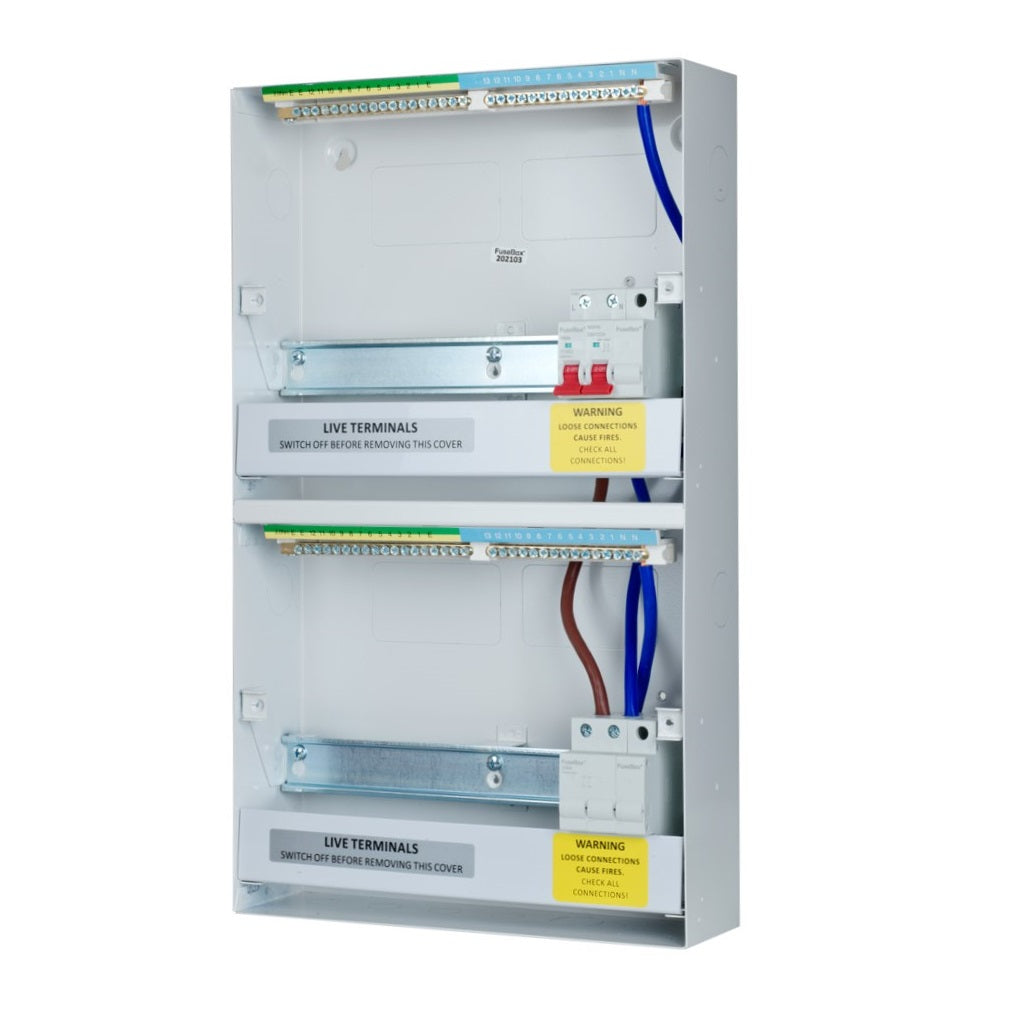Common Misconceptions Regarding RCBO CONSUMER UNITS Clarified
Common Misconceptions Regarding RCBO CONSUMER UNITS Clarified
Blog Article
The Function of Customer Systems in Effective Energy Management Equipment
Consumer units are essential to reliable power management systems, working as the key circulation points for electrical power within frameworks. By integrating circuit breakers, they secure circuits from possible overloads, therefore maintaining safety and security and preventing comprehensive failures. The advent of wise innovations has actually further boosted their functionality, enabling real-time information monitoring and nuanced power consumption evaluation. This combination not just maximizes energy use however also promotes the unification of renewable resource resources, thus promoting sustainable practices. Just how, after that, do these improvements equate to substantial benefits in everyday energy monitoring?
Understanding Customer Units

Comprehending the function of customer devices starts with recognizing their crucial feature in safeguarding electric systems. By separating mistakes within details circuits, consumer units prevent extensive interruptions and potential fire threats. This isolation is attained through using circuit breakers that trip or integrates that strike when a mistake is spotted, therefore removing the electric circulation to the affected circuit.
Furthermore, consumer units help with the orderly distribution of power, enhancing the effectiveness of energy usage. They permit the methodical administration of electrical loads, which can be especially vital in commercial and commercial settings where need can fluctuate significantly. Properly maintained consumer systems contribute to the long life of electrical systems and assist in reducing downtime triggered by electric failings, eventually sustaining the seamless procedure of energy-dependent centers.
Smart Technologies Integration

A key advantage of clever customer systems is their capability to take advantage of advanced formulas and artificial intelligence for predictive analytics. This permits for preemptive adjustments based on usage patterns, weather prediction, and various other variables, substantially boosting overall performance. Furthermore, smart customer devices promote need reaction programs, where energy use can be dynamically readjusted during height periods to stabilize the grid and decrease costs.
The assimilation of renewable resource resources, such as solar and wind, is additionally streamlined via smart consumer units. By smartly taking care of the intermittency of these resources, these units make certain a reputable and well balanced energy supply. Furthermore, clever consumer devices boost individual interaction by providing in-depth understandings and push-button control capacities with mobile applications, fostering a more positive approach to energy conservation and sustainability.
Monitoring Power Intake
Building on the capabilities of wise technologies integration, checking energy consumption ends up being a vital focus within energy monitoring systems. By leveraging advanced metering infrastructure (AMI), real-time data on energy usage can be accumulated at granular levels, giving important insights into usage patterns and peak demand periods.
Smart meters and Web of Things (IoT) gadgets play a crucial function in this surveillance procedure. These tools can track power usage in real-time, transmitting data to centralized systems for evaluation.
The combination of these modern technologies not only empowers consumers with detailed information concerning their power usage yet also supports energy companies in handling lots distribution better. Ultimately, precise and continual surveillance is indispensable for attaining power effectiveness, cost financial savings, and sustainability goals within power monitoring systems.
Optimizing Home Appliance Use

One effective method involves recognizing top and off-peak hours to change energy-intensive activities, such as laundry or dishwashing, to times when energy demand is lower. This not just reduces stress on the grid yet likewise takes advantage of reduced energy tariffs. Furthermore, integrating artificial intelligence formulas permits for predictive upkeep, making sure devices run at optimal efficiency and extending their life expectancy.
Energy monitoring systems can also include user-specific preferences and behaviors to customize appliance use routines. Clever lights systems can adjust illumination based on site web occupancy and natural light accessibility, while HVAC systems can maintain convenience degrees without excessive energy use.
Promoting Sustainability
Promoting sustainability within power administration systems includes not only improving efficiency but also promoting environmentally accountable practices. Customer systems are important to this procedure, as they give real-time information and control mechanisms that allow users to keep track of and minimize their power consumption. By leveraging innovative innovations, customer systems can recognize energy-saving possibilities and assist in the integration of renewable resource here sources like solar and wind power.
One vital aspect of promoting sustainability is enlightening customers on the advantages of accountable energy use. With comprehensive understandings provided by customer systems, customers can make educated decisions that minimize their carbon footprint. These devices can suggest ideal times for operating high-energy home appliances based on grid need and eco-friendly power availability, consequently minimizing reliance on fossil gas.
In addition, customer systems support the adoption of smart grid modern technologies, which boost the overall effectiveness and reliability of power distribution. By making it possible for two-way communication between customers and energy companies, these systems can dynamically adapt to energy needs, minimizing waste and promoting using sustainable energy practices.
Conclusion
Customer units, as indispensable components of energy administration systems, considerably enhance electric security and effectiveness within buildings through circuit defense and smart modern technology assimilation. Additionally, the consolidation of eco-friendly energy resources promotes sustainable practices, contributing to reduced total power consumption and lower carbon impacts.
Breakthroughs in clever technologies have actually transformed the capabilities of power administration systems, particularly via the integration of smart consumer units.Structure on the capacities of clever innovations integration, keeping track of power next page consumption ends up being a critical focus within energy monitoring systems.Reliable device use optimization is an essential element of power monitoring systems, aiming to enhance performance and decrease unnecessary power consumption.Consumer devices, as important elements of energy management systems, considerably boost electric safety and efficiency within buildings with circuit defense and clever technology assimilation. In addition, the unification of renewable energy resources advertises sustainable techniques, adding to reduced total energy consumption and lower carbon impacts.
Report this page